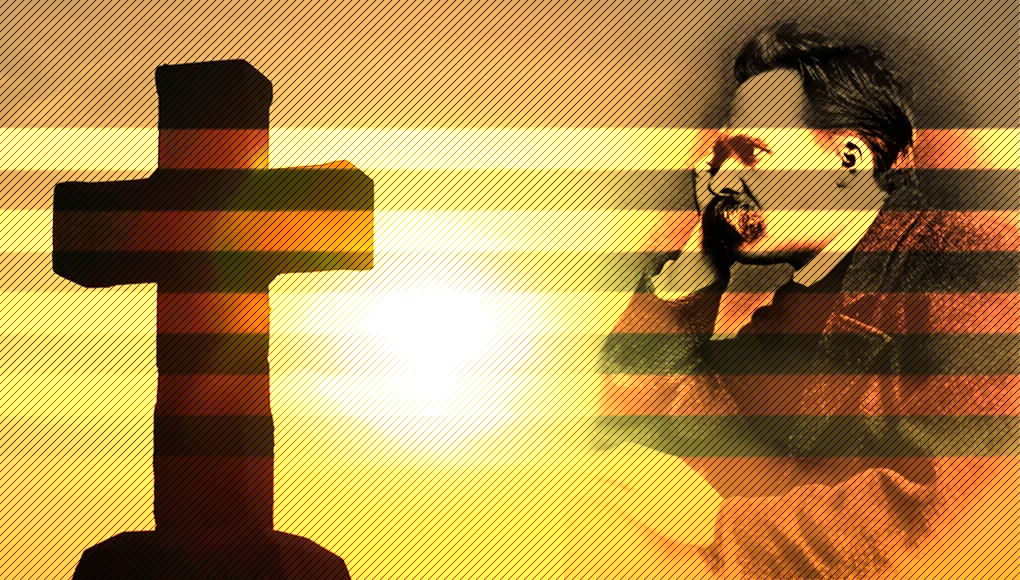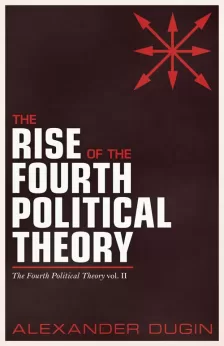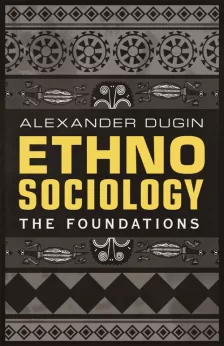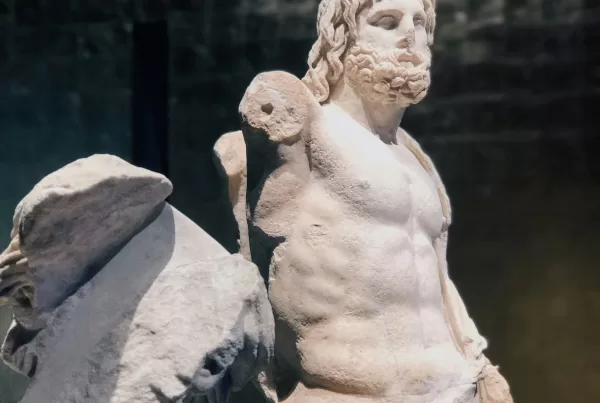Nietzsche, arguably one of the most important Western philosophers of the 19th century, sits firmly within two of Western philosophy’s greatest traditions: social criticism and religious criticism. Nietzsche is perhaps most famous for demonstrating a remarkable contempt for Christian morality, and by extension, the figure of Jesus, at least as that figure was traditionally conceived. But it was not only to Christian traditionalism that Nietzsche objected; attempts to rationalize or preserve the apparent ‘superstitions’ of the Christian faith with non-supernatural theories provoked the ire of Nietzsche, who saw such things as an artificial gentrification of Christian belief. To discover the true source of Nietzsche’s ‘hatred’ for Christianity, however, involves going beyond his philosophical oeuvre into the thinkers who influenced him, and beyond, into his long-term vision for what was undeniably a 19th-century society still caught up in the twilight of Christian cultural dominance.
‘In the entire New Testament,’ Nietzsche writes in The Antichrist, ‘there is only one person worth respecting: Pilate.’1 It makes quite a statement to praise the killer of Christ, but speaking more generally this is a good reflexion of Nietzsche’s attitude towards the flaws of Christianity. On a theoretical basis, the objection to Christianity which Nietzsche appears to raise concerns the ‘guilt’ which Christianity can be seen to instil within its adherents. In Beyond Good and Evil, Nietzsche presents the harnessing of desires for the purpose of achieving one’s goals as a transcendence of the traditional deontological distinction between moral ‘good’ and ‘evil’; thus, the Christian focus on forgiveness, continual recognition of one’s ‘sins’ and the discouragement of the passions, such as lust or wrath, Nietzsche suggested demonstrated Sklavenmoral, the morality of slaves, who, being unable to fulfil their own desires, wallow in the legitimized self-pity and an institutionalized suppression of what would otherwise be considered the natural order of things which only Christianity could offer. In a sense, Nietzsche saw Christianity as stifling the natural artistic and cultural possibilities of the human race, from which Nietzsche believed true power could be wrested. This sense of ‘stifling’ is reflected in his description of the God of Christianity:
[The Christian God] degenerated into the contradiction of life; instead of being life’s transfiguration and the eternal ‘Yes!’ [God is] a declaration of war against life, against nature, against the will to live!2
Nietzsche’s own impassioned attempt at autobiographical writing manifested itself in Ecce Homo, which perhaps best represents the kind of morality that he intended to promote in Christianity’s stead. Whilst outwardly appearing self-aggrandising, with such chapter titles as ‘Why I Write Such Good Books’ and ‘Why I Am Destiny,’ Nietzsche’s wit represents the replacement of the imitation of Christ with the imitation of the perfect version of one’s own self. It is because of this that Pilate is worthy of Nietzsche’s respect; his refusal to accept Jesus as his ‘truth’ (John 18:38) preferring instead to continue to question after the truth, makes him a species of arch-philosopher, as well as a forerunner to Nietzsche himself. The perfectness and completeness of Christianity was its ‘curse’, since, by presenting life as a series of black-and-white truths, it failed to allow for critical thinking outside of the model which it created for the Sklaven who followed it.
On a related note, the philosophy of Nietzsche may be seen as a reaction against the bourgeois complacency of the 19th century in general. It was not merely deontological slave-morality for which Nietzsche held contempt, but (what he considered to be, perhaps on account of the popular Victorian modes of English philosophy found in Mill and Sidgwick, a uniquely ‘English’) consequentialist master-morality as well. All forms of bourgeois culture were supported by the framework of some kind of political or cultural Christianity at the time, and attempts to move away from traditional Christianity still manifested themselves as petty bourgeois intellectualism which failed to address the constraints placed upon Man by ideology. Alasdair MacIntyre catagorizes Nietzsche alongside the likes of Foucault, the so-called ‘genealogical moralists’ who emphasized the continuous emancipation of the individual from any form of restraint.3 MacIntyre, as part of his own moral project, accepted that Nietzsche’s critique of Enlightenment morality was valid, that deontology entailed an extreme of black-and-white thinking and as such, unwarranted emotional responses to legitimate moral concerns. As such, this kind of ‘Victorian’ morality could only ever be ephemeral, and Nietzsche was right to dismiss it as this.4 Nietzsche’s polemical attacks on bourgeois morality are further seen in Untimely Meditations; there, he attacks David Friedrich Strauss who, by his theory of religion as myth, allowed the intellectual middle class to continue their adherence to the Christian faith, albeit in a groundless and superficial manner, explaining away the miracles of the Bible with contorted naturalistic speculations; in many ways, it might be said Nietzsche had more respect for traditional Christians than for nominally ‘Christian’ theologians who tried to reconcile faith with a rationalist exegesis of the New Testament. David Strauss’ abrogation of remarks in earlier chapters of his work, Das Leben Jesu, for the sake of presenting rationalist explanations, angered Nietzsche, as this directly contradicted his passion for the search for truth. In short, Nietzsche also saw Christianity as the religion of the bourgeois liberal, devoid of real substance and conservative to the point of obstinacy when it came to merely bourgeois values. It therefore commanded little respect from him, he being a man of such avowed independent purpose, and it continues to sit badly with Nietzscheans to this day for similar reasons.
Nietzsche’s hatred of Christianity may have deeper roots than merely methodological antitheses, however. From a young age Nietzsche appears to have been influenced by various philosophers, most importantly Feuerbach, who had presented the thesis that it was Man who created God, rather than the other way around;5 he was influenced much more by Arthur Schopenhauer, an atheist who had prefigured Nietzsche in his identification of Christianity as ‘perfect resignation [from the pain of existence]’.6 And it is from Schopenhauer’s Wille zum Leben (Will to Life) that Nietzsche appears to have garnered inspiration for the Wille zur Macht, which may be described essentially as Schopenhauer’s transcending of the restraints of the will, but abandoning the Schopenhauerian glorification of irreligious pessimism, at the same time guarding against the moral nihilism which, Nietzsche observed, Schopenhauer himself did not care for, but which followed as a natural result of the acceptance of Schopenhauerian atheism. Any vestiges of philosophical self-pity and self-annihilation were to be cast away by the Wille zur Macht in favour of the exultation of the aims and desires of the self. Nietzsche’s early career as a classical scholar also appears to have contributed to his anti-Christian sentiments. Nietzsche expressed praise of the ‘agonistic’ culture of ancient Greece, and whilst he appears to still reject elements of any Greek philosophy which drew its principles from deontic morality, it is certainly true that Greek mythology and the cathartic exercise of Greek drama lent themselves better to the will-based morality to which Nietzsche adhered. Nietzsche’s harsh remarks about women appear to have a classical influence as well, with many lifted mainly from Aristotle,7 and whilst traditional Christianity cannot be said to be immune from the same by any means, the rigidly hierarchical and fickle characterizations of men and gods of the pagan classical world fitted in far more perfectly with Nietzsche’s views. Such a deep respect for pagan philosophy might certainly imbue a certain residual level of contempt for an outwardly egalitarian Christianity, at least insofar as the Christian God actively punished those who acted according to their base will, in most instances whilst the pagan gods of mythology themselves tended to act precisely in such a manner.
Yet, for all of Nietzsche’s apparent hatred and antagonism, it would be exceedingly unfair to characterize him in completely negative terms re Christianity. Whilst Nietzsche’s characterization of Christianity as a ‘curse’ may appear extreme, he nevertheless remained of the belief that he was doing something positive for civilization, instigating a form of philosophical electroshock treatment to stun the world out of Christian complacency. Not only did Nietzsche reject all pessimism (such as Schopenhauer’s) but he saw the liberation of humanity from Christian complacency as a return to the natural state of the Northern European man.8 At the same time, he criticized nationalism and anti-Semitism, something which he saw as a culturally empty offshoot of bourgeois (and particularly in the case of the latter, Christian) morality, and which were represented in his own time by the music and prose polemics of Richard Wagner, with whom he paradoxically had maintained a friendship.9 Indeed, both nationalism and anti-Semitism were rife in Germany from the middle to the end of the 19th century as a result of the unification movement – something which Germany’s Old Guard, which came to be known as the Alter Konservativen, fervently opposed.
Whilst the posthumous editions of Nietzsche published by his sister Elisabeth pushed the philosopher’s ideas towards a National-Socialist bent for many years, modern scholarship has allowed us to realize that Nietzsche is in fact better read not as encouraging the replacement of Christianity with an authoritarian dominance of the weak by the strong per se, but instead as a kind of reinvention of Christianity by and for individuals. Nietzsche may have held deep philosophical grievances about Christianity, but a strangely Christian spirit of overcoming one’s natural inclinations in order to become something greater than oneself remains within Nietzsche. An opponent of power politics and an advocate of free will, Nietzsche in many ways represents the figure of Jesus more purely than many of the bishops and Popes who ‘succeeded’ Christ.10 Indeed, Nietzsche’s own upbringing as the son of a Lutheran pastor cannot have had any little impact upon him. The oft-misrepresented quotation, in fact a lament more than a triumphant declaration, that ‘God is dead. God remains dead. And we have killed him’11 is in fact the outcry of one of the Western world’s most poignant and fearful moral crises: remove God, and Man is forced to create his own values. Nietzsche knew well the consequences of rejecting the Christian God. In this sense, however much Nietzsche may have disliked the Christian God, we cannot say that he ‘hated’ the concept of deity, period. Whilst it may be controversial to say that Nietzsche believed that every man ought to be his own God, what is certainly true is that Nietzsche reworked the idea of imitating a divine figure, and attempted to focus human creative energy upon the perfection of the self, rather than the emulation of what he considered to be a self-destructive and misleading Christological abstraction. To put it in Danto’s terms, Nietzsche wished for philosophy itself, not some bourgeois institution, to become people’s way of life.12 At the same time, it seems that Nietzsche’s underlying recognition of an inescapable natural order is the true root of his concept of the Overman. Not all people would take well to the life of Nietzsche’s future perfect philosopher, nor would they be able to fulfil the criteria for inclusion in this apparently elite group. Nevertheless, such is the case in every society that there must naturally exist ranks and elites. It appears that, for Nietzsche, the act of striving for philosophical perfection itself was a necessary and sufficient act in separating the Overmen from the rest of society. That in itself is by no means a hateful project, nor is it necessarily incompatible with the aims and values of Christianity, which in certain forms accepts the spiritual differences between those who strive for spiritual perfection (albeit in the imitation of a particular interpretation of Christ, rather than the Overman) and those who wallow in mediocrity. Perhaps, therefore, Christianity’s escape route out of mediocrity lies not only in rediscovering the roots of its traditional ethical positions, but in making Christ into a model Overman worthy of the struggle itself.
Nietzsche is a complex and paradoxical philosopher in many ways, and does not lend himself to reduction to a single judgment. Nor would Nietzsche wish for this, for such ‘comprehensive judgments’ are of the realm of the Enlightenment moralist, not the free-spirited individual, as Nietzsche saw the perfect Man. If we had to give a reason for Nietzsche’s hatred of Christianity, then we might say that Nietzsche hated the idea of institutionalized restraint, which expressed itself in a bourgeois conservation of spent values and an over-simplification of the moral questions of life into a simple dichotomy between ‘good’ and ‘evil’, which almost all religion, not merely Christianity, tends towards. His response to the ensuing moral nihilism was a philosophy of will and a concept of independent value-creation, which can strike one as exceedingly organic, in the best traditions of reactionary European statecraft. All the while, the ‘Christian complacency’ of 19th century bourgeois liberalism which Nietzsche identified was neither truly Christian, being instead rationalist and uncomfortable with Christian orthodoxy, nor complacent, being at heart unstable and morally corrupt. In developing his solution to the problems which this ‘Christian complacency’ brought about, however, Nietzsche perhaps owed more of his philosophy to the figure of Christ, mercilessly deconstructing the formalism of the Pharisees, than to the Antichrist whose mantle he appears to have taken on.
Nietzsche is recognized today as one of liberalism’s most important critics – an epithet he perhaps would be more willing to accept given the political and moral climate of modernity, much of which is the logical conclusion of the frustrations of Nietzsche’s own time. Whether one accepts his critique of Christianity or not, it is his critique of moral theory (including his critique of those which have had the most formative impacts on Christianity) which remains of great important to those contemporary philosophers who attempt to piece together a new system for a New Right. Indeed, if the moral argumentation of the Enlightenment is insufficient, we must find a way in which to conclusively reject it and replace it. Nietzsche offers one of the best refutations of Enlightened mindset, and shows his reader a crucial exit from its near-ubiquitous clutches: independent value-creation. As human beings, we shall never escape the need for moral codes and moral judgments, but we may begin to re-think what it means to be a ‘righteous person’, independently of the expectations of society, with the help of a little Nietzschean thought.
References:
1 H. L. Mencken (trans.), The Antichrist, c. 46.
2 Ibid., c. 18.
3 A. MacIntyre, Three Rival Versions of Moral Inquiry, cc. 2, 9.
4 A. MacIntyre, After Virtue, c. 2.
5 Vid. L. Feuerbach, Das Wesen des Christentums (1841).
6 A. Schopenhauer, The World as Will and Representation, vol. 1, c. 48.
7 W. Durant, The Story of Philosophy, p. 86.
8 The Antichrist, c. 19.
9 vid. ‘Richard Wagner in Bayreuth’ in Untimely Meditations.
10 B. Magnus in The Cambridge Companion to Nietzsche, p. 1.
11 W. Kaufmann (trans.) The Gay Science, c. 125.
12 A. C. Danto, Nietzsche as Philosopher, c. 8.










Excellent, engaging article on a fascinating philosopher. Thank you.
Excellent article